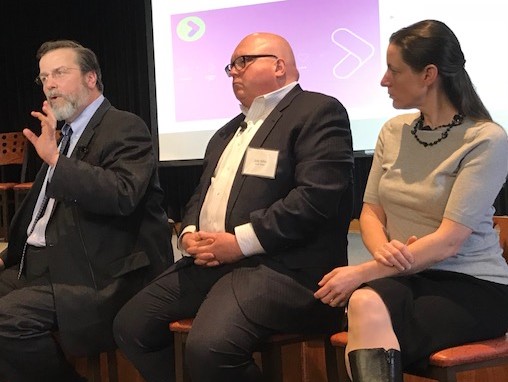
HOOKSETT, NH — More than 200 leaders from across the state converged on Southern New Hampshire University’s Mara Hall on March 28 for a Dartmouth-Hitchcock hosted forum entitled The Real Cost To Business: The Mental Health and Addiction Crisis. The audience, comprised of the state’s legislative, medical, business and non-profit communities, heard from an all-star panel of experts who first defined NH’s issues around mental health and addiction and their impact on the work place, and then offered examples of what is being done on the local level to address the issue.
Among the top of many national rankings — in a bad way — NH trails only West Virginia in rates of drug and alcohol abuse for those 12 years of age and older. The state has also lagged in its funding of mental health issues, leading to 2012 lawsuits by the Disability Rights Center and the U.S. Department of Justice.

In kicking off the half-day event, moderator Tom Raffio labeled the event as a “true to call action.” The President and CEO of Northeast Delta Dental went on to say event organizers hoped that the forum would serve as a catalyst for future efforts.
Raffio was joined by lead-off speakers Joanne M. Conroy, M.D., CEO of Dartmouth Hitchcock and Governor Chris Sununu. Dr. Conroy stated that “this issue truly touches all of us,” and shared a personal story of a formerly addicted family member who was now five years sober. The Governor, who earlier this week announced the launch of his Recovery Friendly Workplace Initiative, said the Granite State is “leading the charge,” on the opioid issue. “Nobody gets this like we do,” he said. “Our state has made a lot of strides.”
As CEO of a family-owned ski resort prior to assuming the corner office in the state capital, Governor Sununu described initial efforts to help employees struggling with mental health or addiction issues as “makeshift” and that his company had to learn on the fly to address the problem and support the employees. The company also created an internal peer support system by pairing those in recovery with those who had already been through the process.

Fast-forward to the present, and Sununu says he hopes New Hampshire can be model for other states in the union, and has offered other governors access to materials from the Recovery Friendly Workplace Initiative. He also lauded the state’s network of partners and advocates, saying “this is do-able, win-able and solvable.”
The morning’s keynote speaker, retired Department of Veteran’s Affairs Secretary Robert McDonald used his experiences from the VA, his military career, and his role as head of Proctor and Gamble, to underscore the value of workplace solutions in battle against the issues of mental health and addiction. “There is a stigma connected to mental health issues and alleviating that will lead to change,” he said.
McDonald also said that businesses can take an active and positive role when “governed by values andnot rules. You can do well and do good at the same time.”
The morning session was capped off by a panel moderated by John T. Broderick Jr., former NH Supreme Court Justice and Senior Director of Public Affairs at Dartmouth-Hitchcock. The panel, which featured local and national experts, discussed behavioral health challenges and opportunities in the workplace and in schools. Justice Broderick, who speaks to student across the state on the issue of mental health, recounted the many interactions he’s had with young people. “They’re tired of the shame and shadows (of mental health issues).”
Kate Frey, Vice President of Advocacy for New Futures, said that NH’s economy is drained of many millions of dollars each year in lost productivity, sick days, accidents, increased health care costs and other issues attributed to addiction and mental health issues. This creates a negative downstream issue that “we all pay for,” she noted. Ken Norton, Executive Director of the National Alliance on Mental Illness (NAMI), discussed several state challenges, including lack of mental health beds, which means that daily as many as 45 people can be waiting in hospital emergency departments across the state. This puts ED doctors “in a very bad position,” he said, adding that “treatment delayed often makes the issue worse,” for those in crisis.
Seddon Savage, MD, Advisor for Dartmouth-Hitchcock’s Substance Use and Mental Health Initiative, moderated a second panel and praised NH’s can-do attitude when it comes to problem-solving. “We’re small, but creative.” She added that several years ago there was a stigma attached to talking about a disease like cancer but now that conversation is common place. “I hope we can get to the same place when it comes to talking about mental health.”
Panelist Marty Boldin, Governor Sununu’s Advisor for Prevention, Treatment and Recovery, described himself as being in recovery saying, “I was the bad kid from the bad family in the bad part of town.” He went on to say that there are 60,000 people in NH currently living in recovery. He picked up on a popular theme of the meeting adding that “addiction is a non-partisan issue” and drew laughs from the crowd when the self-described “left wing, bleeding heart liberal” shared a surprise phone call he received from Governor Sununu offering him a job in the new administration.
Robert McLellan, MD, MPH gave a short presentation from the occupational health perspective, saying the healthiest businesses can balance “their outcomes for business along with the health of their employees.”
Other speakers at the event included:
Amanda Grappone Osmer, CEP, Grappone Automotive Group, Will Torrey, MD, Vice Chair for Clinical Services at Dartmouth-Hitchcock. Joe Sifer, Executive Vice President-Booz Allen Hamilton, Craig S. Kramer, Mental Health Ambassador – Janssen R & D, a Johnson and Johnson Company and Rebecca Hamilton- Co-owner – W.S. Badger Company.
In addition to Dartmouth-Hitchcock, sponsors included: Northeast Delta Dental, Charles Schwab, Hypertherm Hope Foundation, NH Business Review, IHeart Radio, the BIA, New Futures, NAMI NH, State of New Hampshire, and the Concord, Manchester and Nashua Chambers of Commerce.







